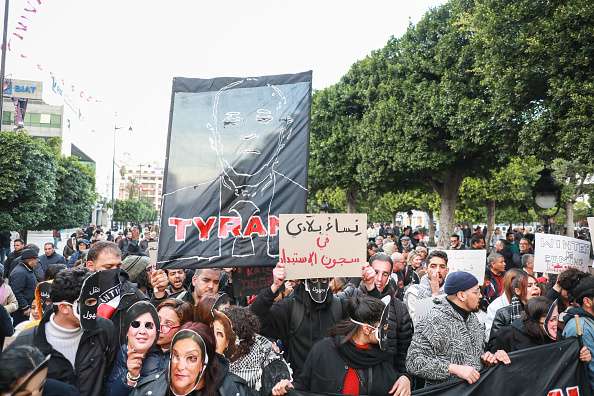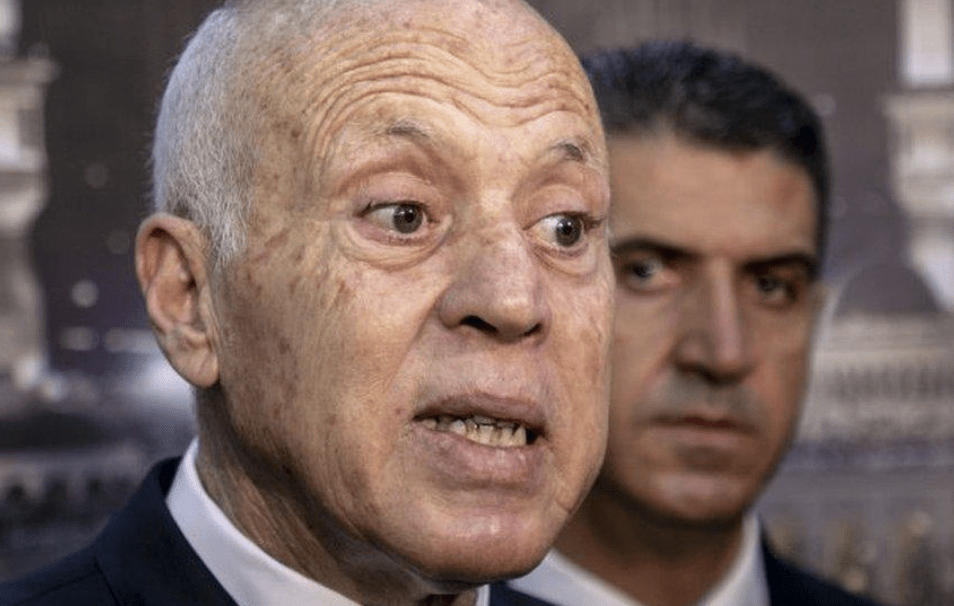Tunisian court jails journalist as rights groups protest crackdown

Demonstrators hold up a giant banner bearing the effigy of Tunisian President Kais Saied that reads ''Tyrant,'' while others wear masks representing jailed political figures, journalists, and civil society activists during a protest in Tunis, Tunisia, on January 14, 2025. The protest marks the 14th anniversary of the flight of former Tunisian President and dictator Zine el-Abidine Ben Ali, following a call for demonstrations by the Tunisian Network for Rights and Freedoms. They call for the preservation of the gains of the Tunisian Revolution and protest against what they describe as the authoritarian drift of Tunisia's President Kais Saied, as well as against the assault on democracy, freedoms, and rights by the authorities. Following a popular uprising in Tunisia between December 2010 and January 2011, which the authorities brutally repressed, Zine el-Abidine Ben Ali is forced to flee the country on January 14, 2011. This date becomes the official commemoration of the Tunisian Revolution, called Revolution Day, marking the start of the 'Arab Spring' and leading to major political changes in Tunisia. In 2021, the current president, Kais Saied, changes the date for commemorating the Revolution from January 14 to December 17. (Photo by Chedly Ben Ibrahim/NurPhoto via Getty Images)
A Tunisian appeal court has upheld a six-month prison sentence against journalist and pro-Palestine activist Ghassan Ben Khelifa for “offending others via social media,” as reported by The New Arab plus agencies on July 18th.
Rights groups and press freedom advocates have condemned the ruling as politically motivated and an attack on dissent. The conviction falls under Article 86 of Tunisia’s Telecommunications Code and stems from a 2022 case accusing Ben Khelifa of managing a Facebook page allegedly containing “jihadist” content. Investigations found no link between him and the page.
Despite this, the court confirmed the original sentence, prompting outrage from civil society groups, media unions, and political activists. They view the case as part of a wider crackdown on pro-Palestinian, anti-imperialist voices and wider suppressions within Tunisian society.
“This is not just about Ghassan. This is an attack on anyone who stands up for the oppressed, who speaks out against exploitation, imperialism, and Zionism,” Inhiyez platform said in a statement on July 17th. “It is an attempt to muzzle critical journalism and intimidate the free press.”
Ben Khelifa, a prominent figure on Tunisia’s progressive left and an outspoken critic of authoritarianism, has championed causes including the boycott of Israel and solidarity convoys to Gaza. After the verdict, he said his legal team had filed to suspend the sentence and seek cassation.
Intersection for Rights and Freedoms condemned the ruling as a “blatantly unjust verdict,” warning of a dangerous trend to silence dissent. The Joint Coordination for Palestine in Tunisia called the sentence “revenge-driven,” urging Justice Minister Leila Jaffel to end the “judicial farce.”
Ben Khelifa’s supporters pledge to fight the ruling through legal and public channels. Human rights groups warn that Tunisia, under President Kais Saied, increasingly targets critical voices through courts and broad laws.
The New Arab and agencies, Maghrebi.org
Want to chase the pulse of North Africa?
Subscribe to receive our FREE weekly PDF magazine














